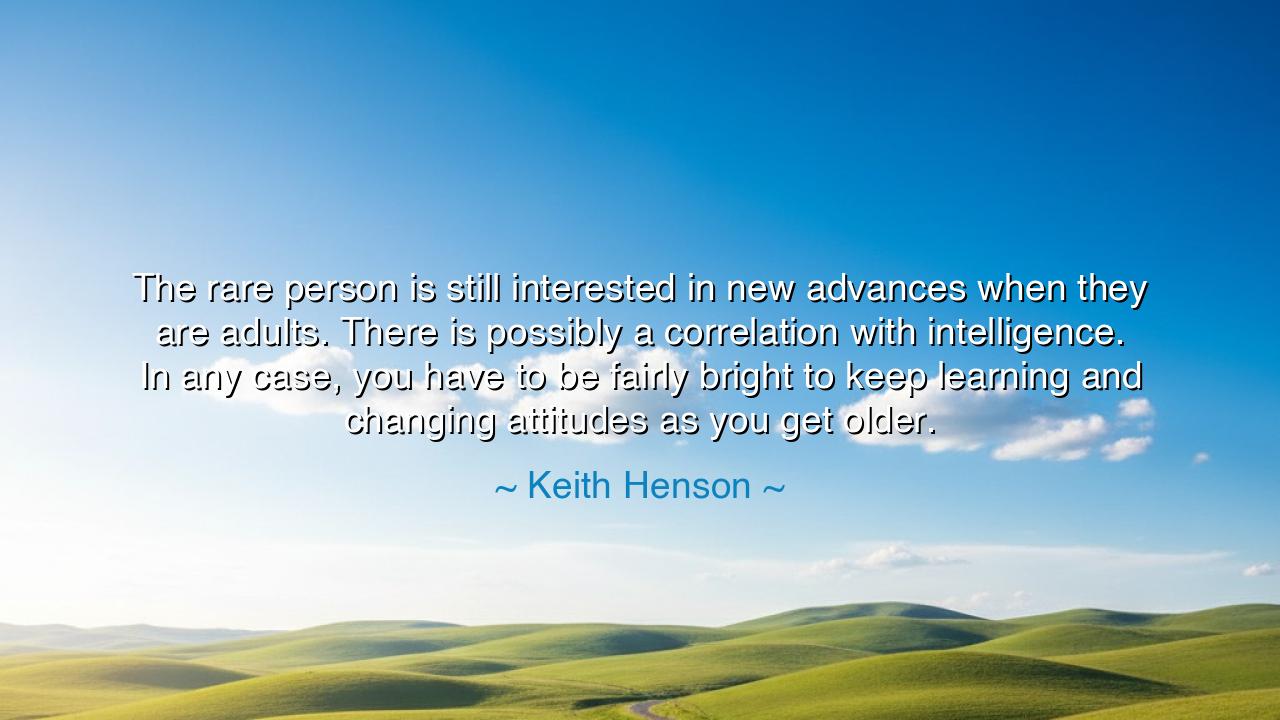
The rare person is still interested in new advances when they are
The rare person is still interested in new advances when they are adults. There is possibly a correlation with intelligence. In any case, you have to be fairly bright to keep learning and changing attitudes as you get older.






“The rare person is still interested in new advances when they are adults. There is possibly a correlation with intelligence. In any case, you have to be fairly bright to keep learning and changing attitudes as you get older.” Thus spoke Keith Henson, an engineer and thinker who gazed beyond the machinery of technology into the workings of the human mind. In this reflection lies a truth both sobering and noble — that the pursuit of knowledge is not merely a habit of youth, but a calling of the spirit, and that few maintain the curiosity and humility required to keep growing when age begins to harden the heart and the mind.
Henson’s words are rooted in the modern age, yet they echo the wisdom of the ancients. He lived in a time when knowledge multiplied faster than ever before, when each decade brought discoveries that reshaped the world. Yet he saw how easily the human spirit can grow weary, how the fire of learning that burns brightly in childhood often fades in adulthood. The origin of this quote lies in his study of technology and intelligence — his observation that the truly wise are not those who know most, but those who remain teachable. To him, the ability to learn and adapt, even as years pass, is itself a sign of true intelligence.
For the mind, like the body, must be exercised to remain alive. When one stops learning, the spirit begins to decay. To stay curious is to resist the slow petrification of the self — that quiet closing of doors that happens when we think we have seen enough, understood enough, become enough. Thus, Henson’s statement is not merely about intellect; it is about the courage to stay open, the rare bravery to let go of certainty and embrace wonder. To “change attitudes as you get older” is to perform one of life’s most difficult acts — to admit that wisdom has no final form, that truth is not a relic but a river, ever flowing.
History gives us shining examples of those who kept learning until their last breath. Leonardo da Vinci, even in his final days, filled his notebooks with sketches, questions, and experiments. His curiosity was boundless; he studied clouds, bones, and water with the same awe as when he was a boy. Or Charles Darwin, who, long after writing On the Origin of Species, continued to refine his ideas and to doubt them, never mistaking knowledge for completion. These were not merely brilliant minds — they were humble ones, knowing that the mystery of life is infinite, and that the moment one ceases to question, one ceases to live fully.
Yet, as Henson says, such people are rare. For most, the world becomes smaller with age. Comfort replaces curiosity; opinion replaces inquiry. The mind grows rigid, not because it must, but because fear takes root — fear of being wrong, of feeling foolish, of losing the illusion of certainty. True intelligence, Henson suggests, is not measured by IQ or memory, but by the flexibility of the mind, by the ability to unlearn, relearn, and remain in conversation with the unknown. To learn is to stay alive; to stop learning is to begin dying.
The message, then, is both warning and invitation. If you would be among the rare few, keep your wonder alive. Do not let your opinions fossilize; let them evolve. Seek out new knowledge as one seeks sunlight after a long winter. Read, question, listen — not only to confirm what you believe, but to challenge it. For every new understanding widens the soul and renews the spirit. To stay curious is to stay free.
Let this be the lesson passed to all who hear: intelligence is not a gift but a practice, not a fixed light but a flame that must be tended. Age will try to dim it with comfort and pride, but those who keep learning defy time itself. Be humble enough to change, and brave enough to grow. For as Keith Henson teaches, it is the rare and truly bright soul who keeps walking toward wisdom — even when the road stretches endlessly ahead, and the light of discovery shines ever farther on the horizon.






AAdministratorAdministrator
Welcome, honored guests. Please leave a comment, we will respond soon